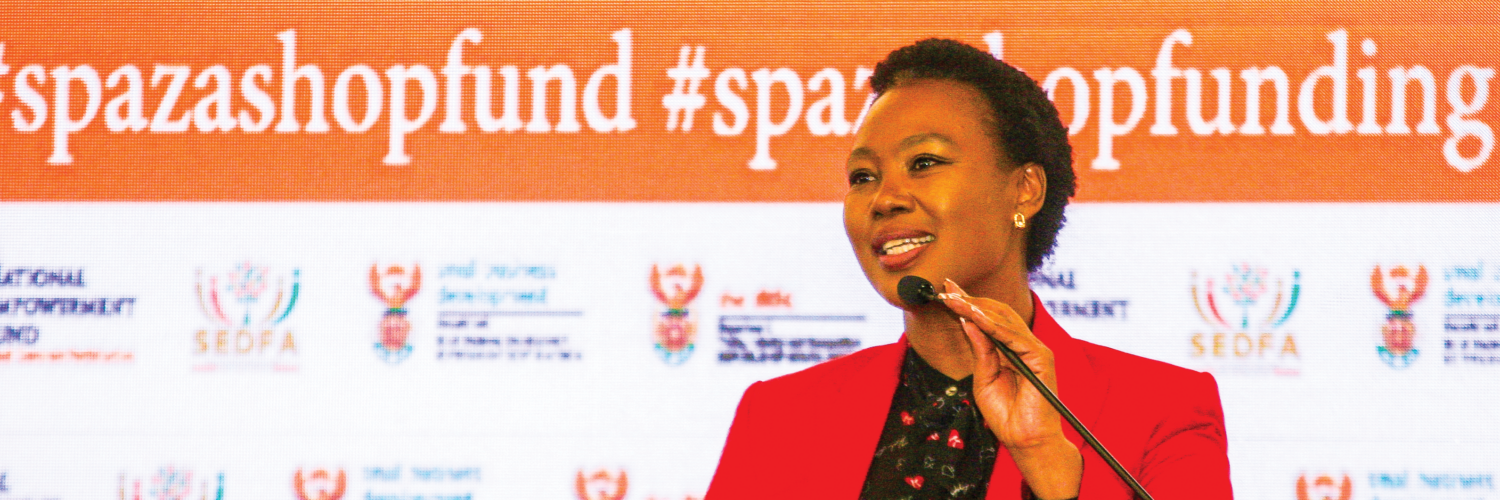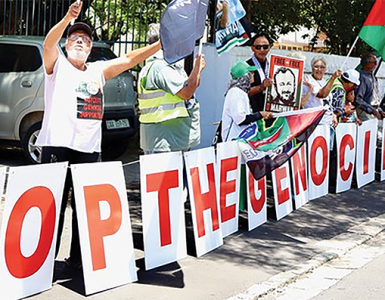TRANSFORMATION: Initiative to prioritise young entrepreneurs, including women empowerment…
By Jacob Mawela
Throngs of people from far and wide descended upon Soweto’s Eyethu Shopping Centre Soweto this week to witness Minister of Trade, Industry and Competition Parks Tau and Small Business Development Minister Stella Ndabeni, launch the R500 million Spaza Shop Support Fund.
Such was the sense of anticipation for the kick-start of the transformative initiative – announced by President Cyril Ramaphosa back in November 2024 – that the venue was festooned with crowds who could not make it inside hall.
Johannesburg mayor Dada Morero had to momentarily exit the hall to personally apologise to the multitudes outside who couldn’t gain entry.
In his address, Morero described Soweto as the birthplace of Black entrepreneurship, in which the late Dr Richard Maponya remained one of the shining stars of entrepreneurship. The mayor made an undertaking that his administration would invest money towards the skilling of SMMES.
Another speaker, Gauteng Finance and Economic Development MEC Lebogang Maile, undertook to augment national government’s launch sum with additional contribution from his provincial department, while he spoke of the need to revive defunct Black industrial zones such as Babelegi and Ekandustria as drivers of production in the township economy.
Small Enterprise Development Finance Agency (SEDFA) executive Nkosikhona Mbatha thereafter invited a Dobsonville-based spaza shop owner named David Maluleka to share his experiences of running his business. Expounding that he had been operating his shop for over 15 years, having persevered amid seeing other operators quitting, Maluleka delved into the familiar narrative of starting out small by selling loose cigarettes on the streets and progressing to selling basics such as bread, milk, eggs – and then later acquiring a point-of-sale system to help him in rudiments such as managing profit, through governmental assistance. “Managing a business is not pap en vleis,” he reminded the gathering before concluding by expressing his hope to acquire funding from the new initiative so that he could expand his operation as well as the number of people he employs.
In his address, Tau, marked the start of the transformative initiative as an opportunity to right the wrongs bedevilling township spaza shops. emphasizing the imperative of progressing from “spaza to makoya” at a juncture of unemployment and poverty. Tau further opined that the initiative would transform the landscape.
In her address, Ndabeni began by congratulating the Tshabalala family – at whose hall the fund was launched – for continuing their father Ephraim’s legacy, as she contextualised Soweto as comprising the majority of small businesses, hence the government’s decision to launch the initiative there.
Speaking in an uncompromising tone, she issued a warning in advance unto those who think they’d defraud the system by co-opting themselves into devious marriage arrangements with foreigners or through ‘fronting’. Ndabeni exhorted operators to diversify the value chain and not saturate it by peddling similar offerings. “To have Black business, small business must grow,” she pointed out and thereafter assured attendees that, through the overture, “you have a partner in us.”
The minister then concluded her brief speech by formally declaring that the fund had been officially launched.
To be jointly administered by the National Empowerment Fund (NEF) and the Small Enterprise Development Finance Agency (SEDFA), the fund will provide critical financial and non-financial support to township businesses, including community convenience stores and spaza shops. The aim of the fund is to support South African owned businesses in order to increase their participation in the townships and rural areas’ retail trade sector.
“The opening of the applications for the fund marks another milestone in government’s efforts to stimulate the growth of the rural and township economy in the country, particularly by providing the necessary support to the convenience stores and spaza shops that are based in the townships and rural areas.
Government recognises the important role that small businesses, including those operating in the rural areas and townships, can play in creating jobs, growing our economy and alleviating poverty,” Ndabeni said..
The fund provides various types of support including the initial purchase of stock via delivery channel partners, upgrading of building infrastructure, systems, refrigeration, shelving and security, as well as training programmes which include Point of Sale devices, business skills, digital literacy, credit health, food safety, business compliance.
Minister Tau pointed out that the fund would, not only support economic inclusion, but also align with national priorities to formalise informal sectors, safeguard consumers and promote local production. “Beyond individual support, the fund seeks to bolster the broader supply chain by fostering partnerships with local manufacturers, black industrialists and wholesalers. Through bulk purchasing arrangements and the promotion of locally produced goods, spaza shops will benefit from reduced costs and increased access to quality products,” Tau said..
To qualify for the fund, spaza shops must be 100% South African-owned and must operate in South Africa, serving local communities. Foreign-owned businesses are not eligible, even those owned by naturalised citizens, unless the owner was naturalised prior to 1994. Qualifying businesses must be registered with their local municipalities and be fully compliant with the relevant by-laws an.d licensing requirements. They must also be registered with the South African
Revenue Service for income tax and value-added tax. The fund will prioritise entrepreneurs aged between 18 and 35, as well as female-owned spaza shops or businesses owned by persons with disabilities.
Two funding packages were introduced at launch. The first package, valued at up to R100 000, includes a R40 000 grant for initial stock purchases, and a 50:50 blended R50 000 grant and low-interest loan component for the upgrading of building infrastructure, systems, refrigeration, shelving and security. The package also involves R10 000 worth of non-financial support which will go towards training.
The second package, geared at fully registered and compliant entities, is valued at up to R300 000. It also involves a R40 000 grant component for initial stock purchases, along with R250 000 blended finance component for upgrades, marketing, and the purchase of digital equipment such as point of sale devices and inventory management software. This package also includes R10 000 worth of non-financial support geared towards implementing systems for efficient stock management, accounting and payment gateways, as well as integrating logistical solutions to make deliveries and warehousing as affordable as possible.





























